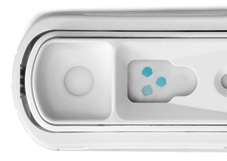Colostrum is the thick yellow ‘first milk’ that is produced by the mares udder at the time of foaling. It is high in carbohydrates and protein, but most importantly it is absolutely packed with antibodies. These antibodies come from the mare’s bloodstream and become highly concentrated in the colostrum in the weeks before foaling. Foals are born with no immunity at all. They have an immune system that will produce its own antibodies but this takes time. As soon as they are born they are exposed to bacteria and other nasties, and they need to be set up to fight these soon after birth. So where do these necessary immediate antibodies come from? The only way foals can get immediate antibodies is from mares colostrum. Acquiring antibodies from the mare via colostrum within the first 12-24 hours of life is critical for good foal immunity and early health. The transfer of antibodies from colostrum ONLY occurs in this 12-24 hour window when the foals intestine allows the uptake of antibodies. After this time, antibodies can no longer be absorbed.
This time frame is the ‘golden window of opportunity’ to give the foal antibodies that will provide protection for it from bacterial and viral challenges it will be exposed to in its new world.
Healthy foals normally stand within an hour of being born and drink soon after. For good, immediate protection, the average foal needs 1-2 litres of colostrum. The better the colostrum, the higher the antibody concentration.
What factors might prevent a foal getting enough colostrum?
- The mare has no colostrum (eg mare foals prematurely).
- The mare’s colostrum is poor quality (eg mare is sick or runs milk before foaling).
- The foal won’t nurse/can’t stand (eg foal born unwell).
- The foal doesn’t drink enough (eg foal rejected by mare).
- The foal doesn’t drink soon enough (eg foal born weak or sick).
Is it possible to check the quality of the colostrum?
If you know how good the colostrum is, then you can easily decide if you need to supplement your foal with extra colostrum to make sure they get enough antibodies.
It is possible to get an indication of the quality of the colostrum by seeing how thick it is or feeling how sticky it is between your fingers. These measures are not really reliable, but thin, watery colostrum that looks like milk is likely to be of poor quality.
The best objective means of checking quality is to measure the thickness via a colostrum meter or colostrometer. This is a simple device that uses light to gauge the thickness. We can measure this for you if you bring a sample of colostrum to us.
There is a distinct advantage in knowing the quality of colostrum as soon as the foal is born. As mentioned earlier, there is a small window of time for the foal to absorb enough good quality colostrum. If you know the colostrum is not good quality then its simple enough to get good colostrum from a source (colostrum bank) and give it to the foal within that 12-24 hour window. The foal can be supplemented with colostrum via a bottle or stomach tubed. Both of these are simple procedures.
Measuring the antibody level in the foal.
An alternative means of determining if the foal has enough antibodies from colostrum, is to test its blood. There are 2 blood tests available. The laboratory blood test is good but has to be sent away, so results are not known until after the critical period. The second test is a ‘foal side’ check we can do, called a snap test.
This has the distinct advantage of giving us results in 10 minutes. If the foal is tested within the 12-24 hour window and if they are low the foal can be supplemented straight away with another source of colostrum.
Low antibody level after the 24 hour window.
After 24 hours the antibodies in colostrum are no longer able to be absorbed by the foal. So if the foal has low antibodies; giving more colostrum after this time will not help. However it is possible to boost the foal’s antibodies by giving it antibodies from another horse - this is via a plasma transfusion.Plasma is a pre-prepared product that is frozen and needs to be given into the foal’s vein.
Plasma containing antibody is a difficult and time consuming product to make, so consequently this product is expensive.For this reason, finding out sooner within the 24 hour window is a huge advantage in being able to quickly and cheaply boost antibody levels with colostrum.
- Brendon Bell


